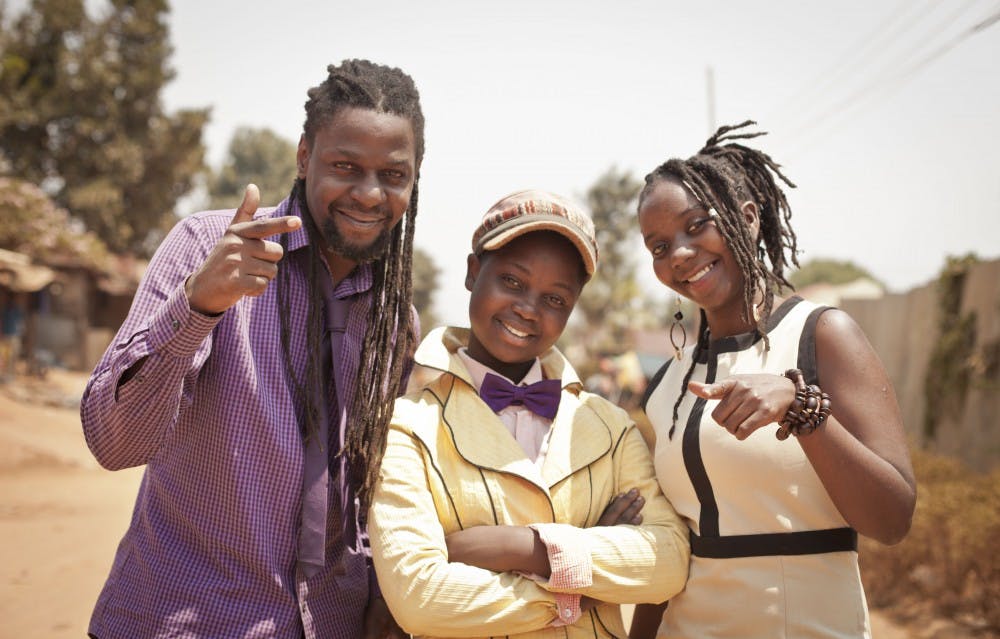If rap brings Eminem, Juicy J or O.T. Genasis first to mind, you haven’t seen the other side of hip-hop yet. Every week, NewzBeat anchors Lady Slyke and Survivor deliver their flow filled with news from all over the world.
Paul Falzone, an Annenberg Ph.D. graduate and founder of Peripheral Vision International, has produced NewzBeat since 2013. NewzBeat is a weekly video series that features national and international news for the Ugandan public. He said he is trying to answer the question, “how can we engage pop culture and existing ways of distributing media in a way that people would pick up the content on their own?”
Each NewzBeat episode is about five minutes long, covering four to five topics of the week. The episodes are made in both English and Luganda, the most-widely spoken local language in Uganda.
Falzone previously worked as a producer creating documentaries and web videos, but his experience with a consulting job at Uganda piqued his interest in establishing a non-profit organization to create an impact on Ugandan society.
“Uganda chose me. It’s a weirdly addictive place,” he said.
Since Uganda has an incredibly young population — the average age being 15.5 years old there — Falzone wanted to create a unique way to draw the nations’ attention to current events. The rap news team in Uganda decides on which topics to include in each week’s episodes, and the rappers present the content like anchors.
“It’s easier to train a rapper to be a journalist than to train a journalist to rap,” Falzone said.
The episodes are broadcasted on air, but Falzone added that because 90 percent of households don’t have electricity, he distributes the content through video halls where people come together to watch collectively. He also uses radio, Facebook and YouTube to deliver the content as widely as possible.
Broadcasting unbiased news in Uganda is particularly significant now given the country’s current political situation. Devra Moehler, professor at Annenberg School of Communication focusing on political communication, described the Ugandan political landscape as a “hybrid system” or “quasi-democracy.”
“There is election, but in other ways the government is ver y much in control,” she said.
According to the 2014 Human Rights Watch World Report, “after 27 years in office, President Yoweri Museveni’s government increasingly suppresses freedom of assembly, expression, and association while escalating threats to civil society.”
Lee Shaker, a professor at Portland State University who is conducting efficacy research on Falzone’s projects, also acknowledged the not-so-democratic political situation in Uganda.
“[An] ongoing fundamental problem in Uganda is corruption of the government and public officials,” he said.
By including corruption incidents from other countries in their coverage, NewzBeat tries to address political issues in Uganda while still avoiding possible governmental regulation. Shaker said NewzBeat’s approach to handling corruption is fundamentally different from those by other news outlets.
“We are not showing stories about Uganda or the president of Uganda, but we are showing stories of completely different spaces and people,” he said.
Shaker’s experiment showed a priming effect. NewzBeat episodes discussing corruption in other nations impacted the audience’s opinions about its government. However, the effect was an unexpected one.
“People started to see their situation favorably,” Shaker said, mainly because the news stories were about large-scale corruption taking place in South Africa or Ukraine, whereas corruption in Uganda is small-scale day-to-day happenings.
To tailor its coverage to the research results, he said NewzBeat is now covering smaller-scale stories that are met with legitimate punishment.
Shaker also evaluated whether the collective viewing environment affected how viewers absorbed the message. He said there wasn’t significant difference between each viewing circumstance, but is looking to evaluate the conversation spurred by watching together in video halls.
“All over the world, people absorb information in a different way, and that’s the beauty of PVI,” Malini Doddamani, senior director of Wharton Marketing and Communications and PVI board chair, said. “PVI is meeting people where they are, rather than trying to get its message across in the way we know how.”
Moehler added that Falzone’s attempt to combine entertainment with information is also a smart way to have people pay attention to the news. Doddamani also voiced a similar opinion.
“Education and entertainment does not have to be separate,” she said.
Falzone said that although there is a hip-hop community called “Lugaflow” in Uganda, the most popular type of music is dance-hall infused pop.
“Because hip-hop is not such a mainstream category, it can be more identified with the community,” he said.
Since its establishment in 2011, Peripheral Vision International has remained unaffiliated with any government, preferring to stay independent. It’s support comes from many organizations’ donations and grants.
“It’s impressive to me that Paul is from the Annenberg School. It’s just amazing to see the work he’s doing in Uganda,” Doddamani said. “He is the son of this institution.”



